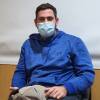Local Boston businesses are mixed over Mayor Michelle Wu’s COVID vaccine mandate for people working and patronizing indoor recreation venues, announced at a press conference Monday morning.
Beginning Jan. 15, people aged 12 and up will have to present proof of at least one vaccination dose for access, and proof of being fully vaccinated by Feb. 15, to enter indoor recreational sites such as gyms, restaurants and museums. Children aged 5-11 will have to prove vaccination to enter, too, on a later timeline.
Some local business leaders say the new measures are too much, others not enough.
Bob Luz, president and CEO of the Massachusetts Restaurant Association, said some of his 1,400 members already have vaccine requirements for restaurant patrons. But, while he called for everyone in Massachusetts to get vaccinated, Luz added that many think it should be up to each individual owner.
“It has broader implications and larger implications,” Luz said. “That is, when it affects consumer confidence, that's when it certainly affects business — we've seen it numerous occasions as we've maneuvered through these very difficult waters ... and it's really the last thing we need right now.
“The business community has been hardest hit in Boston during this pandemic,” he went on, “and so we have a long road from recovery there.”
But Josiah “Joe” Spaulding, president and CEO of the Boch Center, which runs the Wang and Schubert theaters in Boston, said they’ve had vaccine requirements in place since reopening in August — and that it’s been very effective in tamping down the spread of infection.
“We felt as an institution that the number one thing that we needed to protect was the public to come for the shows,” Spaulding said.
Spaulding said they were one of the first venues in the region, if not the nation, to require proof of full vaccination or a negative test in the previous 72 hours to enter. They’ve had some 75,000 people attend their two theaters in the months since they’ve been open, he added, with 2% or less choosing to show a negative test instead of proof of vaccination.
“Then we went one step further and we provided rapid testing on site in case you screwed up and left your thing at home ... and it worked surprisingly well,” he said.
But the arrival of the newest ‘variant of concern,’ the highly transmissible omicron variant of the SARS-CoV-2 virus, makes it even more important to have vaccine requirements. The CDC released new figures Monday that showed nearly three-quarters of new COVID-19 infections in the United States last week were cause by the variant.
“Recently we've had a lot of positives, backstage and front of house, and a lot more than we were a month ago,” Spaulding said, “and we think it has to do with the new variant. ... So we're just trying to be as safe as possible.”
Spaulding said he thinks Wu’s vaccine requirements don’t go far enough.
“I think she should not put in a timeline as long as she did for people 12 and up to be fully vaccinated by February 15th,” Spaulding said. “I think it should be sooner than that. I'd even like to see it on January 15th."
With the rapid spread of the omicron variant, though, Luz questioned the effectiveness of such proof-of-vaccination requirements.
“Certainly, we do renew our call for all individuals to get vaccinated in Massachusetts,” Luz said. “That being said, breakthrough cases have been happening every day, and including in cities like New York City, and New Orleans — where they've had a vaccine mandate for months. And so the question I think becomes, is this an effective step?”








